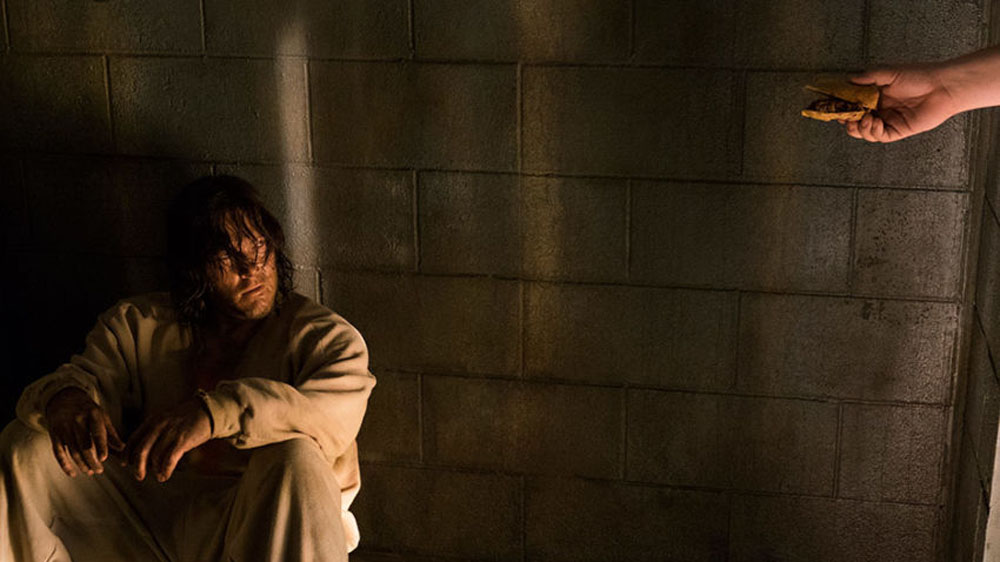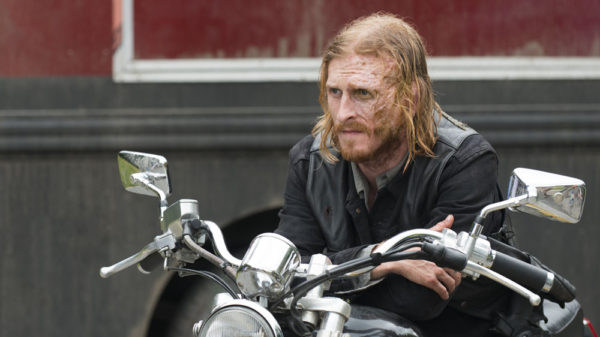After the highs and lows of the opening two episodes that showed us two extremes of what The Walking Dead can be, it settled into a much more familiar pattern this week.
‘The Cell’ is, for want of a better term, fine. It’s competent in the way The Walking Dead at its base level is competent, and contains one genuinely great story among a few others that just plod along.
Like a lot of these middle-of-the-road episodes, it’s mostly workmanlike, and belabours just about every point it wants to make which compensates slightly for the fact that the story has to be stretched and stretched to last the full 45 minutes. It’s neither the best nor worst episode of this young season, and it doesn’t particularly crush hopes or raise promise for the following episodes, with intriguing potential balanced out by the seeds of something far less promising.
By far the strongest aspect of ‘The Cell’, and the best case for its existence as a solo episode rather than, as it perhaps should have been, a subplot in a wider-reaching instalment, was the exploration of Negan’s beleaguered lieutenant, Dwight.
In previous appearances, Dwight didn’t make much of an impact, ticking off most of the attributes of a generic supporting character in his first appearance before inexplicably becoming a villain in his subsequent appearance, so it’s undoubtedly this episode’s best achievement that he leapfrogs the mass of supporting characters here to become a surprisingly compelling figure.

Part of the reason why Dwight works is he adds a personal dimension to an exploration of the Saviors that is, elsewhere, somewhat dry and insubstantial. He personifies the defining dilemma of Negan’s totalitarian society, which is the difficult question of whether constant abuse and loss of one’s identity is worth safety from danger and a high status.
Through his strong characterisation that keeps a strong handle on the constant push-and-pull between his outward loyalism and repressed morality, ‘The Cell’ pulls off the tough task of taking a character who was pretty straightforwardly dislikeable in prior appearances and making him into a genuinely tragic victim of horrible circumstances without changing anything drastic.
In the episode’s best scene as Dwight confronts a fleeing Savior who’s given up on living in a system that doesn’t allow any real life to be lived at all, ‘The Cell’ sparks a fascinating debate surrounding the balance between principles and pragmatism, and places Dwight far closer to the centre of that line than his initial demeanour expected.
Austin Amelio doesn’t nail every moment given to him (he’s not particularly convincing when he’s forced to act intimidatingly), but he does a strong job of selling Dwight’s self-awareness of the fact that he’s spouting vapid, baseless rhetoric as justifications for his own actions. There’s a real sense of tragedy in the way in which Negan’s rule has corrupted everything that was once individual about Dwight and replaced it with homogeny, and that, as the kicker, Dwight signed his free will away of his own volition.
Placed next to that grim reality where Dwight just becomes an extension of Negan, the Savior’s choice to reassert his own independence by choosing death above servitude seems downright justifiable, and it’s clear in Dwight’s weary, gritted-teeth demeanour that he’s somewhat tempted by the option.

It’s a strong character arc that actually does far more to communicate the bullying manipulation of Negan’s rule than any scenes featuring the man himself.
That’s perhaps one of the most noteworthy warning signs in ‘The Cell’, as cracks are already showing in the character of The Walking Dead’s Big Bad early on in his reign. Jeffrey Dean Morgan continues to play the character with relish, and he’s one of the very few things about the show these days that can be considered ‘fun’, but ‘The Cell’ makes it abundantly clear that as a character, Negan is almost entirely hollow.
He appears in a handful of scenes here, and all of his actions drive the plot forward, but that’s as much as you can say – there’s no tangible motivation or psychological coherency behind his gleeful villainy, and his objective remains exactly the same as it was with Rick in the premiere. He’s precision-engineered to be ‘unpredictable’ – taking mercy on Daryl when violence is hinted at as the more obvious options – which creates an image of complexity, of a layered character informed by inner debate and divisions.
In reality, though, it’s not much more than an image, and throughout Negan’s function is only really to push the plot forward by doing ‘memorable’ things – he’s a plot device with one mode (smug-sarcastic) in ‘The Cell’ as opposed to a genuine character and the clear patterns of how he’s deployed by the writers are already all-too clear, which is problematic given how much Negan’s appeal leans on his ‘unpredictability’.
Morgan continues to shine, but The Walking Dead needs to deepen Negan as a real character and give him a wider variety of things to do rather than smirk, and talk about the violent actions he could perform, because otherwise his shtick will get stagnant fast.
The other major arc in ‘The Cell’ belongs to Daryl, and it more-or-less embodies the passable yet uninspired atmosphere of the episode. It rides heavily on the shock of seeing a fan-favourite character in pain, and, in the early going, ‘The Cell’ finds interesting ways to exacerbate that feeling of shock, drilling in the hellish reality of his imprisonment with exaggeratedly awful depictions of his treatment which involve dog food sandwiches and endless jazz.
For a while, you can sympathise with the constant psychological war of attrition played on Daryl as the Saviors chip away at his psyche bit by bit. Later, though, ‘The Cell’ shifts from intentional monotony to… well, intentional monotony, as the novelty value of the early scenes fades to leave a generic and somewhat shapeless arc.

For one, we barely get any real insight into his psyche – Daryl has always been a stoic figure, but he’s so taciturn for the majority of ‘The Cell’ that it’s virtually impossible to track his psychological state; the episode doesn’t make up for this through performance either, as Norman Reedus seems to have the same facial expression the entire episode.
The result is that once we get to the catharsis of Daryl’s small act of rebellion by asserting his own identity, a moment that’s reasonably well-executed in of itself, it doesn’t feel like a satisfying culmination – just a conclusion that ‘The Cell’ has arrived at from an intermittent and meandering character arc that lays a haphazard path to its destination.
As a companion piece to last week’s Kingdom episode, ‘The Cell’ is at the very least an interesting comparison. It depicts a world defined by polar opposite values to the Kingdom, ruled over by a similarly monolithic figure who seeks to crush and oppress his residents instead of inspiring them with his presence.
At the very least, it speaks to The Walking Dead’s varied and layered world-building that it can present such drastically different worlds in subsequent weeks. Yet compared to the focus of ‘The Well’, ‘The Cell’ lags a touch behind. It’s by no means a bad episode, and it balances its grim subject manner with enough humanity that you can genuinely feel a multitude of emotions watching, which at least speaks to some progress from prior episodes.
With Dwight, for instance, ‘The Cell’ carves one of the more interesting character studies of a man who’s equal parts loathsome and sympathetic, providing a ticking time bomb for the future that could explode at any point in fascinating ways.

For the most part, though, this was a very average instalment, ridden by repetitiveness and a lack of clarity on character motivations, and cycling through some familiar themes and imagery (walkers as analogues to humans, the very idea of a character we like facing brutal treatment in an enemy settlement).
Season 7 has had an unusual start thanks to its sprawling, ever-shifting focus, and as such it’s hard to get a handle on just what The Walking Dead intends to be this year. Are we heading somewhere interesting this year? Three episodes in, and it’s too early to call.
Let’s just hope the season gets a clear handle on the stories it intends to tell sooner rather than later…
![]()
Aired at 9pm on Monday 7 November 2016 on FOX.
Buy the complete Season 1-6 box set on Amazon here.
What did you think of this week’s episode? Let us know below…

